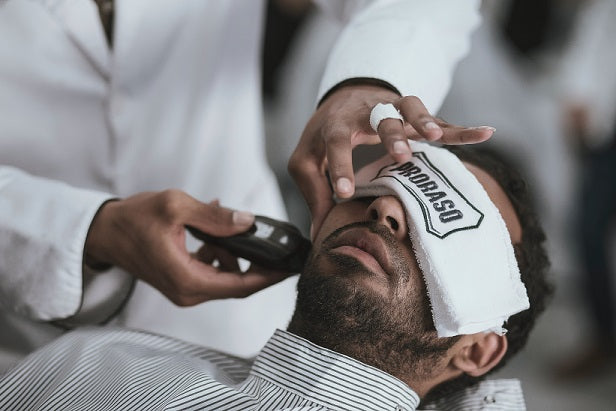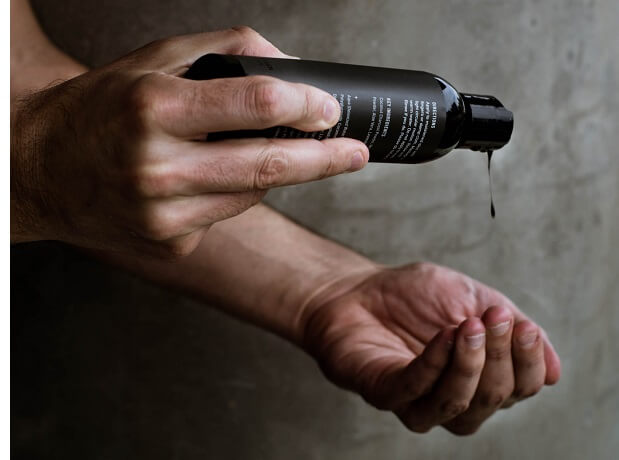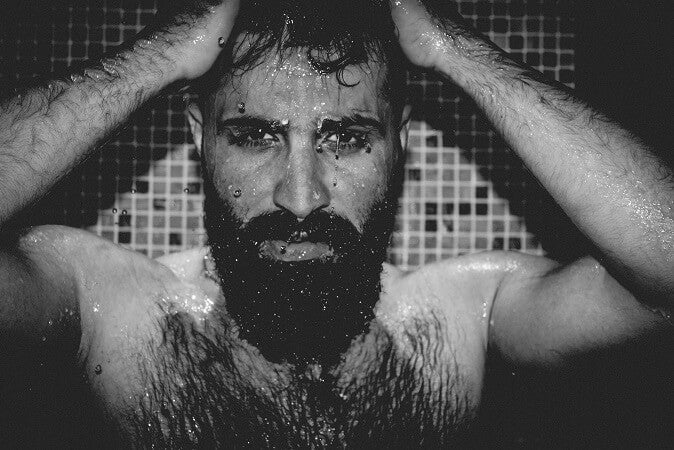3 Best Practice Tips for Dandruff Control
- Consistency is Key: Use anti-dandruff products regularly, even after symptoms improve.
- Gentle Care: Avoid harsh scrubbing and hot water, which can irritate your scalp.
- Holistic Approach: Combine proper hair care with a healthy diet and stress management for best results.

Are you tired of constantly battling those pesky white flakes on your shoulders? Dandruff can be a frustrating and embarrassing problem, but with the right anti-dandruff products, you can say goodbye to flakes and hello to healthy, beautiful hair. In this comprehensive guide, we'll help you navigate the world of anti-dandruff solutions and find the perfect product for your unique hair type. Whether you're dealing with occasional flakes or chronic dandruff, we've got you covered. Let's dive in and discover how to banish dandruff for good!
Understanding Dandruff: Causes and Symptoms
Before we explore the various anti-dandruff shampoo options available, it's essential to understand what causes dandruff and how to identify it. Dandruff is a common scalp condition characterized by flaking of the skin on your scalp. While it's not contagious or serious, it can be uncomfortable and affect your self-esteem.
Common causes of dandruff include:
- Dry skin
- Oily, irritated skin (seborrheic dermatitis)
- Sensitivity to hair care products
- Malassezia, a yeast-like fungus
- Other skin conditions like psoriasis or eczema
- Hormonal changes
- Diet deficiencies
- Stress and weakened immune system
Symptoms of dandruff:
- White, oily flakes on your hair and shoulders
- Itchy, scaly scalp
- Red, irritated patches on the scalp
- Tingly feeling on the scalp
- Mild hair loss in severe cases
Now that we understand the basics of dandruff, let's explore how to choose the right anti-dandruff products for your specific hair type and needs.
Identifying Your Hair Type
To select the most effective dandruff products, it's crucial to understand your hair type. Different hair types have unique needs, and what works for one person may not work for another. Here's a detailed guide to help you identify your hair type:
1. Oily Hair
Characteristics: Greasy appearance, especially at the roots, often within a day of washing
Care tips: Use clarifying shampoos, avoid heavy conditioners, and consider more frequent washing
2. Dry Hair
Characteristics: Brittle, prone to breakage, lacks shine, and often feels rough
Care tips: Use moisturizing shampoos and deep conditioning treatments, avoid heat styling
3. Combination Hair
Characteristics: Oily roots but dry ends
Care tips: Focus on balancing products, use different treatments for scalp and ends
4. Normal Hair
Characteristics: Well-balanced, neither too oily nor too dry
Care tips: Maintain with gentle, pH-balanced products
5. Fine Hair
Characteristics: Thin strands, lacks volume, and can become greasy quickly
Care tips: Use volumizing products, avoid heavy conditioners, consider dry shampoo between washes
6. Thick Hair
Characteristics: Dense, coarse strands that can be prone to frizz
Care tips: Use smoothing and moisturizing products, consider leave-in treatments
7. Curly Hair
Characteristics: Varying degrees of curl pattern, prone to dryness and frizz
Care tips: Use sulfate-free shampoos, deep condition regularly, avoid heat styling
8. Color-Treated Hair
Characteristics: Can be dry or damaged from chemical treatments
Care tips: Use color-safe products, minimize washing, and use protective treatments
Once you've identified your hair type, you can start looking for anti-dandruff shampoo and other products that cater to your specific needs.
Key Ingredients in Effective Anti-Dandruff Products
When shopping for anti-dandruff products, it's essential to look for specific active ingredients that target the root causes of dandruff. Here's a detailed look at the most effective ingredients:
1. Zinc Pyrithione
This antifungal agent helps reduce the growth of dandruff-causing yeast on your scalp. It's effective for mild to moderate dandruff and is safe for long-term use.
2. Ketoconazole
A powerful antifungal that's effective against severe dandruff and seborrheic dermatitis. It works by disrupting the cell membranes of fungi, effectively killing them.
3. Selenium Sulfide
Slows down the production of skin cells on the scalp and has antifungal properties. It's particularly effective for oily scalps but can discolor light-colored hair if not rinsed thoroughly.
4. Salicylic Acid
Helps to exfoliate the scalp and remove dead skin cells. It's great for removing existing flakes and can help other ingredients penetrate better.
5. Tea Tree Oil
A natural antifungal and antiseptic that can help soothe an itchy, flaky scalp. It's a good option for those preferring natural ingredients.
6. Coal Tar
Slows down the production of skin cells and can help with scalp psoriasis. It can be very effective but may have a strong odor and can make your scalp more sensitive to sunlight.
7. Piroctone Olamine
An antifungal agent that's effective against Malassezia and is often used as an alternative to zinc pyrithione.
8. Ciclopirox
A broad-spectrum antifungal that's effective against various fungi, including those responsible for dandruff.
When choosing dandruff products, look for these ingredients and consider which ones might be most suitable for your specific scalp condition and hair type. It's often beneficial to rotate between products with different active ingredients to prevent your scalp from becoming resistant to a particular treatment.
Choosing the Right Anti-Dandruff Shampoo for Your Hair Type
Now that you know your hair type and the key ingredients to look for, let's explore how to choose the perfect anti-dandruff shampoo for your needs:
For Oily Hair:
- Look for lightweight formulas that won't weigh your hair down
- Choose shampoos with salicylic acid to help control excess oil
- Avoid products with heavy moisturizers
- Consider shampoos with tea tree oil or selenium sulfide
For Dry Hair:
- Opt for moisturizing formulas with ingredients like coconut oil or shea butter
- Look for gentle, sulfate-free shampoos
- Consider products with added vitamins and minerals to nourish your hair
- Zinc pyrithione-based shampoos can be effective without being too drying
For Combination Hair:
- Choose a balanced formula that addresses both oily roots and dry ends
- Look for products with zinc pyrithione, which can help regulate oil production
- Consider using different products for your scalp and ends
- Try shampoos with dual-action formulas that cleanse and moisturize
For Fine Hair:
- Select volumizing formulas that won't weigh your hair down
- Look for lightweight ingredients like tea tree oil
- Avoid heavy, oil-based products
- Consider shampoos with salicylic acid to remove buildup without adding weight
For Thick Hair:
- Choose rich, moisturizing formulas to tame frizz and nourish strands
- Look for products with ketoconazole for stubborn dandruff
- Consider using a pre-shampoo treatment to help the product penetrate thick hair
- Opt for shampoos with multiple active ingredients for comprehensive care
For Curly Hair:
- Look for sulfate-free anti-dandruff shampoos to avoid stripping natural oils
- Choose products with added moisturizers like glycerin or aloe vera
- Consider co-washing with a dandruff-fighting conditioner between shampoo uses
- Look for shampoos with zinc pyrithione or ketoconazole
For Color-Treated Hair:
- Opt for color-safe anti-dandruff shampoos
- Look for products with gentle cleansers and added color protection
- Consider shampoos with natural antifungal ingredients like tea tree oil
- Use a clarifying treatment occasionally to remove buildup without stripping color
Remember, finding the right anti-dandruff shampoo may take some trial and error. Don't be discouraged if the first product you try doesn't work perfectly – it may take a few attempts to find your ideal match.
The Importance of Conditioner in Your Anti-Dandruff Routine
While anti-dandruff shampoo is crucial for treating dandruff, don't forget about the importance of conditioner in your hair care routine. Many people with dandruff skip conditioner, fearing it will exacerbate their scalp issues. However, using the right conditioner can actually help manage dandruff and keep your hair healthy.
Benefits of using conditioner with anti-dandruff shampoo:
- Helps restore moisture lost during shampooing
- Reduces friction and prevents further irritation of the scalp
- Improves hair manageability and reduces breakage
- Can help soothe an itchy, irritated scalp
- Provides a protective barrier against environmental stressors
- Can help distribute natural oils along the hair shaft
Tips for conditioning dandruff-prone hair:
- Focus conditioner on the mid-lengths and ends of your hair, avoiding the scalp if you have oily roots
- Look for lightweight, non-comedogenic formulas that won't clog pores
- Consider leave-in conditioners for extra hydration without weighing hair down
- Use a scalp-specific conditioner once a week for extra nourishment
When choosing a hair conditioner to pair with your anti-dandruff shampoo, look for products that are lightweight and won't clog your pores. For men specifically, there are many men's conditioner options designed to work well with anti-dandruff treatments.
Additional Anti-Dandruff Products to Consider
While shampoo and conditioner form the foundation of your anti-dandruff routine, there are other products you can incorporate for even better results:
1. Scalp Treatments
These intensive treatments can help exfoliate and nourish your scalp, reducing flakes and itchiness. Look for products containing salicylic acid, tea tree oil, or other antifungal ingredients.
2. Leave-In Conditioners
For those with dry or damaged hair, a leave-in conditioner can provide extra moisture without weighing hair down. Choose lightweight formulas that won't exacerbate scalp issues.
3. Anti-Dandruff Serums
These targeted treatments can be applied directly to problem areas on your scalp. They often contain concentrated active ingredients for more intensive treatment.
4. Medicated Scalp Lotions
For severe cases of dandruff, your dermatologist may recommend a medicated scalp lotion. These often contain stronger concentrations of antifungal agents.
5. Scalp Exfoliators
Gentle exfoliation can help remove dead skin cells and product buildup. Look for products with mild chemical exfoliants or soft physical exfoliants.
6. Hair Masks
Deep conditioning treatments can help restore moisture and balance to your scalp and hair. Look for masks with nourishing ingredients like argan oil or shea butter.
When incorporating these additional dandruff products into your routine, be sure to follow the instructions carefully and not overuse them, as this can lead to product buildup on your scalp.
Tips for Maximizing the Effectiveness of Your Anti-Dandruff Routine
To get the most out of your anti-dandruff products, follow these tips:
- Be consistent: Use your anti-dandruff shampoo regularly, even when symptoms improve.
- Rotate products: Alternate between two different anti-dandruff shampoos to prevent your scalp from becoming resistant to a single formula.
- Massage your scalp: When applying shampoo, gently massage your scalp to improve circulation and help the product penetrate.
- Let it sit: Allow your anti-dandruff shampoo to sit on your scalp for a few minutes before rinsing.
- Rinse thoroughly: Make sure to rinse all product from your hair and scalp to prevent buildup.
- Use lukewarm water: Hot water can strip your scalp of natural oils and exacerbate dandruff.
- Don't scratch: Resist the urge to scratch your scalp, as this can worsen irritation.
- Manage stress: High stress levels can trigger or worsen dandruff, so practice stress-reduction techniques.
- Brush regularly: Brushing your hair helps distribute natural oils and removes dead skin cells.
- Watch your diet: A balanced diet rich in zinc, B vitamins, and omega-3 fatty acids can promote scalp health.
- Stay hydrated: Drinking plenty of water helps keep your scalp and skin hydrated.
- Limit heat styling: Excessive heat can dry out your scalp and exacerbate dandruff.
- Use a humidifier: In dry environments, a humidifier can help prevent scalp dryness.
- Let it sit: Allow your anti-dandruff shampoo to sit on your scalp for a few minutes before rinsing.
- Rinse thoroughly: Make sure to rinse all product from your hair and scalp to prevent buildup.
- Use lukewarm water: Hot water can strip your scalp of natural oils and exacerbate dandruff.
- Don't scratch: Resist the urge to scratch your scalp, as this can worsen irritation.
- Manage stress: High stress levels can trigger or worsen dandruff, so practice stress-reduction techniques.
- Brush regularly: Brushing your hair helps distribute natural oils and removes dead skin cells.
- Watch your diet: A balanced diet rich in zinc, B vitamins, and omega-3 fatty acids can promote scalp health.
- Stay hydrated: Drinking plenty of water helps keep your scalp and skin hydrated.
- Limit heat styling: Excessive heat can dry out your scalp and exacerbate dandruff.
- Use a humidifier: In dry environments, a humidifier can help prevent scalp dryness.
Natural Remedies to Complement Your Anti-Dandruff Routine
In addition to using anti-dandruff shampoo and other products, you may want to try some natural remedies to help manage your dandruff:
1. Apple Cider Vinegar Rinse
Mix equal parts water and apple cider vinegar, apply to your scalp, let sit for a few minutes, then rinse. This can help balance your scalp's pH and reduce fungal growth.
2. Coconut Oil Treatment
Massage a small amount of coconut oil into your scalp, leave overnight, and wash out in the morning. Coconut oil has antifungal properties and can help moisturize your scalp.
3. Aloe Vera
Apply pure aloe vera gel to your scalp to soothe irritation and reduce inflammation. Leave it on for about 15 minutes before rinsing.
4. Tea Tree Oil
Add a few drops of tea tree oil to your regular shampoo for an antifungal boost. Be sure to dilute it properly to avoid irritation.
5. Baking Soda Scrub
Make a paste with baking soda and water, gently scrub your scalp, then rinse thoroughly. This can help exfoliate and reduce fungal growth.
6. Lemon Juice
Apply freshly squeezed lemon juice to your scalp, leave for a few minutes, and rinse. The acidity can help balance scalp pH and fight dandruff-causing fungi.
7. Neem Oil
Known for its antifungal properties, neem oil can be mixed with a carrier oil and applied to the scalp as a treatment.
While these natural remedies can be helpful, they should be used in conjunction with, not as a replacement for, your regular anti-dandruff products.
Lifestyle Changes to Support Dandruff Control
In addition to using the right products and treatments, certain lifestyle changes can help manage dandruff:
- Manage stress: Practice relaxation techniques like meditation or yoga.
- Improve your diet: Eat foods rich in zinc, B vitamins, and omega-3 fatty acids.
- Get enough sleep: Proper rest can help boost your immune system and overall health.
- Exercise regularly: Physical activity can help reduce stress and improve circulation to the scalp.
- Avoid harsh hair products: Stick to gentle, non-irritating hair care products.
- Limit alcohol and smoking: Both can contribute to scalp dryness and irritation.
- Wear breathable hats: If you wear hats, choose ones made from breathable materials.
When to See a Dermatologist
While most cases of dandruff can be managed with over-the-counter products, there are times when you should consult a dermatologist:
- If your dandruff persists despite consistent use of anti-dandruff products
- If you experience severe itching or redness on your scalp
- If you notice any signs of infection, such as swelling or warmth on your scalp
- If your dandruff is accompanied by hair loss
- If you suspect your dandruff might be a symptom of another skin condition
- If over-the-counter treatments cause irritation or allergic reactions
- If your dandruff is affecting your quality of life or self-esteem
A dermatologist can provide a proper diagnosis and may prescribe stronger treatments if necessary, such as:
- Prescription-strength antifungal shampoos
- Topical corticosteroids to reduce inflammation
- Immunomodulators to help regulate the immune response in the scalp
- Medicated scalp treatments or lotions
Understanding Dandruff in Different Age Groups
Dandruff can affect people of all ages, but it may present differently and require varied approaches depending on the age group:
Dandruff in Infants (Cradle Cap)
Often resolves on its own, but gentle brushing and mild baby shampoos can help. Consult a pediatrician for persistent cases.
Dandruff in Teenagers
Often related to hormonal changes. Regular use of anti-dandruff shampoos and good hygiene practices are usually effective.
Dandruff in Adults
May be more persistent and require a combination of treatments. Stress management and lifestyle factors play a significant role.
Dandruff in Older Adults
Can be related to drier skin overall. Gentle, moisturizing anti-dandruff products are often most effective.
The Future of Dandruff Treatment
Research into dandruff and scalp health is ongoing, with promising developments on the horizon:
- Microbiome-focused treatments that aim to balance the scalp's natural ecosystem
- Advanced delivery systems for more effective penetration of active ingredients
- Personalized treatments based on individual scalp analysis
- Natural and sustainable anti-dandruff solutions
Conclusion: Embracing a Flake-Free Future
Dealing with dandruff can be frustrating, but with the right approach and products, you can effectively manage this common scalp condition. By understanding your hair type, choosing the appropriate anti-dandruff shampoo and hair conditioner, and following a consistent hair care routine, you can say goodbye to flakes and hello to healthy, beautiful hair.
Remember, finding the perfect anti-dandruff solution may take some time and experimentation. Be patient with yourself and your hair, and don't hesitate to try different products or consult with a professional if you're not seeing the results you want.
With the information provided in this comprehensive guide, you're now equipped to make informed decisions about your anti-dandruff routine. Whether you're looking for men's shampoo options or seeking the best products for your specific hair type, you have the knowledge to choose wisely and effectively combat dandruff.
By combining the right products with a healthy lifestyle and consistent care, you can achieve and maintain a healthy, flake-free scalp. Here's to a future of confidence, comfort, and beautiful hair – free from the worries of dandruff!



